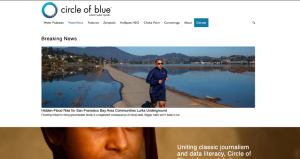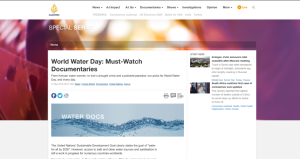Theme: Global Water Resources
Back to Top
|
 |
|
 |
|
Circle of Blue
|
Social studies |
|
Award-winning journalism nonprofit Circle of Blue coined the phrase, "where water speaks" ? and rightly so. From breaking headlines to daily and weekly newsletters and all podcasts and programs in between, Circle of Blue serves as a resource hub for the intersection of "water, food, and energy in a changing climate." Under the WaterNews tab, readers can explore "The Daily Stream" (a daily post on the latest water topics), subscribe to the weekly newsletter, and read up on other prominent stories. Those who prefer auditory learning may want to check out "What's Up With Water," a weekly podcast found on the Water Podcasts page. The Features section surveys particular areas of interest, such as "Water and Climate" or "Water and Financial Risks." On the Zeropolis page readers will find a new initiative that "highlights cities across the globe that are grappling with severe water shortages." Under HotSpots H2O readers will find information on the "changing, often stressed global waterscape." Similarly, the Choke Point section highlights case studies of agricultural regions stricken by water scarcity and contamination. Readers may want to read the Choke Point: Index section before diving into the specific studies. Finally, the Convenings page includes audio recordings and transcripts from past water-related speakers and events. [EMB] |
|





|
|
 |
|
The Deep Sea
|
|
|
Produced by "creative coder" Neal Agarwal, The Deep Sea, "an interactive visualization of the ocean," takes users on an educational and entertaining journey into marine depths. It is a long scroll from the surface to the "deepest point in the ocean reached by humans," but with over one million views, users have certainly found the virtual journey worthwhile. In the first 100 meters, readers will encounter recognizable creatures such as manatees and clownfish. Killer whales come into frame just past 100 meters, as do sea lions, bull sharks, and sea turtles as you approach "The Twilight Zone." At 332 meters you have made it to "the deepest [point] any human has ever scuba dived," an accolade achieved by Ahmed Gabr in 2014. You have probably heard of snow angels, but what about sea angels? You will discover these creatures in the mid-400s (spoiler alert, they are described as "majestic sea slugs that use wings to propel themselves,"). Fast forward to 3,800 meters for a quick history lesson as you reach the Titanic's "final resting place." Then, in 4,000s, search for the fangtooth fish (it looks as scary as it sounds). At the end of the journey, you will reach "Challenger Deep" ? the deepest part of the ocean reached by humans, namely Jacques Piccard and Don Walsh, who journeyed nearly 11,000 meters below the water's surface in a submarine. [EMB] |
|





|
|
 |
|
Water Dialogues
|
Science |
|
Concerned about the erasure of indigenous voices in water management practices, Water Dialogues "explores our conversations around the need to bring our diverse knowledge systems together to address the complex and increasingly critical water issues we face today." The three-chapter podcast (which is available at the link above to stream as individually parts, or as one full episode) was created by Lindsay Day as a part of her Master of Science thesis at the University of Guelph. Day worked in conjunction with a larger project exploring "methods and models for effectively and equitably implementing Indigenous and Western knowledge in water research and management in Canada," which included holding two Water Gatherings, collaborative meetings organized to bring together diverse ideas on water management. Conversations from these gatherings, as well as additional interviews, are included in the podcast. Interested readers may also enjoy Day's full thesis, "Reconciling How We Live With Water: The Development and Use of a Collaborative Podcasting Methodology to Explore and Share Diverse First Nations, Inuit, and Metis Perspectives," which is available for free download following the link embedded in the About section. [EMB] |
|





|
|
 |
|
World Water Day: Must-Watch Documentaries
|
Social studies |
|
Grab your popcorn and prepare for a water system world tour with "World Water Day: Must-Watch Documentaries," a list from the Al Jazeera news network. The list features eight documentaries, representative of four continents and four major themes: gender-justice in water systems, disaster relief and prevention, environmental degradation, and aquatic research and exploration. For example, Senegal's Sinking Villages explores how rising sea levels impacted villagers, while Kenya's Water Women discusses the disproportionate effects of water policies on women in Kenyan communities. In China's Underwater Hunt, you will meet Zang Yi, "China's first female deep-sea submersible pilot," and in The Colorado River: A Lifeline Running Dry you will learn about political power struggles over water usage and control. The documentaries are embedded in the list for easy viewing, and all of them are less than an hour in length ? perfect for educators to use as a lesson plan for World Water Day, or for interested readers to binge watch in honor of the holiday. [EMB] |
|





|
|



















